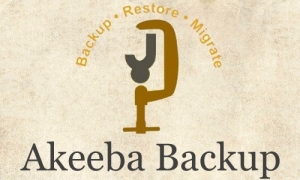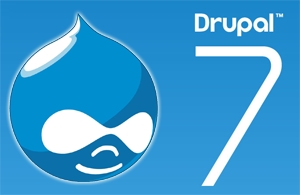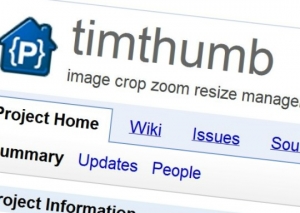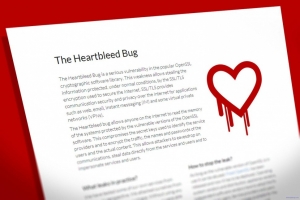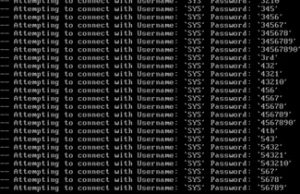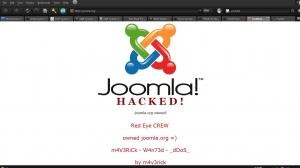Blog Categories
Popular articles
- Installing, configuring, and using OpenVPN server Centos 6.6
- Module Installation php libssh2 on CentOS 6.x
- Mirror CentALT repository for CentOS 5.x - 6.x
- Attention! Critical vulnerability in all versions of Joomla 1.5, 2.5,3 (CVE-2015-8562)
- S.M.A.R.T - monitor the status of hard drives in Centos sending notifications to Email
Basket of services
Company news
- Thursday, 24 December 2015: Merry Christmas and Happy New Year!
- Monday, 20 April 2015: Accepting payments through payment system Webmoney and Z-Payment restored
- Saturday, 18 April 2015: Unavailable accepting payments via Webmoney and Z-Payment
- Thursday, 05 March 2015: To order new services are available - DNS hosting and secondary DNS server
- Wednesday, 25 February 2015: Added new ways to pay for services
Recent blog posts
-
Attention! Critical vulnerability in all versions of Joomla 1.5, 2.5,3 (CVE-2015-8562)
-
Mirror CentALT repository for CentOS 5.x - 6.x
-
Mozilla after Google announced its intention to abandon the valuable work with sites that do not use https
-
Critical vulnerability in Magento
-
Warning! XSS vulnerability in WordPress and a set plug-ins.
Attention! Critical vulnerability in all versions of Joomla 1.5, 2.5,3 (CVE-2015-8562)
Tuesday, 15 December 2015 10:42A few days ago in all versions of Joomla (1.5, 2.5, 3) found critical (0-day) vulnerability that allows an attacker to successfully attack the sites running Joomla absolutely all versions of the Exploitation of the vulnerability of RCE ("remote code execution") and, as a result, to gain complete control over the site. The attack is made possible due to insufficient filtering of variables in the HTTP request (the field HTTP_USER_AGENT, HTTP_X_FORWARDED_FOR, REMOTE_ADDR) and their subsequent use in the session object, and query a database.
As a platform for e-commerce Magento, which works on the basis of a huge number of online stores found critical vulnerability, allows an attacker to execute arbitrary PHP-code on the server and get full access to the data online store, including information on the customer's credit card. The attack can be accomplished without committing authentication. The problem is present in the base of the engine Magento and appears in the default configuration. The problem was identified in February and has already been fixed in the update SUPEE-5344, while for non-disclosure agreement about the vulnerability made public only now.
Warning! XSS vulnerability in WordPress and a set plug-ins.
Thursday, 23 April 2015 11:31April 20, 2015 was publicized critical vulnerability allows an XSS attack on a website that is subject to a huge number of plugins for Wordpress.
The vulnerability is related to the misuse of the developers of plugins and features add_query_arg remove_query_arg, which were not well documented in the documentation Wordpress, plugin developers that introduced misleading and resulted in the feasibility of the attack.
Specialists of the company Sucuri were tested about 300 of the most popular plugins Wordpress, many of them are affected, it was confirmed. We will publish the list below. Developers data plug-ins already released an update covering the vulnerability. However, we want to note that this list is not complete, it is clear that much more vulnerable plug-ins, just as long as they might, no one tested.
Critical Vulnerability in Joomla 2.5 - 3.3x (CVE-2014-7228)
Wednesday, 01 April 2015 21:53September 30, 2014 it became known about the vulnerability in the software company Akeeba. The vulnerability allows remote upload shell, with no rights in the system. Are affected as the products themselves Akeeba: Akeeba Backup, Akeeba Solo, Akeeba CMS Update, Akeeba Admin Tools, and WARNING: all versions of Joomla 2.5 to version 2.5.27, and 3 to version 3.3.5.
The fact that the standard Joomla component updates using scripts of Akeeba. And Akeeba Joomla and released their updates, covering this vulnerability, but they did not consider it a critical vulnerability, and so many people do not pay much attention to it.
Indeed, a hacker could exploit this vulnerability only when you make a backup copy of your site, or are upgrading the site. That is, it is only a few seconds of which the hacker must still somehow and learn.
Critical vulnerability in slider plugin for Wordpress Slider Revolution
Friday, 13 March 2015 02:03Back in September 2014 published a critical vulnerability in the popular plugins for Wordpress Slider Revolution, but to this day we meet a lot of sites exposed the vulnerability.
The vulnerability allows, with absolutely no rights on your site, download wp-config.php file to your site, which contains your data to access the database. With these approaches, an attacker can easily gain control over your site. Vulnerability affects all versions of the plug-in to version 4.1.4. The situation is complicated by the fact that this plugin is not free, it cost $ 18, and so many people from CIS countries use on their websites older versions downloaded from free resources, subject to this vulnerability because they do not have access to updates.
Detected a critical vulnerability in Drupal 7 (SA-CORE-2014-005)
Saturday, 18 October 2014 00:44The company Sektion Eins was found a critical vulnerability, which affects all versions of Drupal 7 branch. It allows you to execute arbitrary SQL-query the database Drupal without any rights in the system. Thus, for example, it is possible with absolutely no rights on your website, create a special request, which will create a new administrator or change the current password. The danger is defined as the highest. October 15 came kernel upgrade to version 7.32, which addresses the vulnerability. Developers are strongly advised to update the kernel immediately.
At the moment, already compromised a lot of sites for this CMS and break-ins continue.
Serious vulnerability in TimThumb. Attention site owners on wordpress!
Monday, 30 June 2014 01:15June 24, 2014 was know about another critical vulnerability in the script timthumb.php, which is used in a huge number of themes and plugins popular engine wordpress. We would like to note that this script is used not only in wordpress, but also in many other CMS, as well as their extensions.
Vulnerability affects all versions of absolutely timthumb, including 2.8.13, as well as the original project WordThumb. The vulnerability allows attackers to run malicious code execution without having access to your site.
Just yesterday, was made public a critical vulnerability in OpenSSL.
The vulnerability is related to the lack of adequate bounds checking in one of the procedures expansion Heartbeat (RFC6520) protocol TLS / DTLS. Due to the small mistakes anyone can gain access to the computer's memory, whose communication "protected" vulnerable version of OpenSSL. In particular, the attacker gains access to the private key, user name and password and all content to be transmitted in encrypted form. When this leaves no traces of penetration into the system.
Massive brute force passwords from admin panel site by Joomla and WordPress. Hosters disable admin sites
Thursday, 08 August 2013 01:02Of such an attack, we have already written, but in recent days they have intensified with incredible force. The essence of the attack is that the bots of passwords to the admin panel of the website. It is dangerous not only because the password sooner or later they still can pick up, but the fact that it was created a pretty decent load on the server.
Since the attacks in recent days have purchased just incredible strength, the server hosts many simply can not withstand such loads exorbitant. Hosters naturally try to cope with this scourge, but it is they do not always work, as the number of bots is huge and firewalls can not cope with so many locks. Therefore, some of them, as a temporary solution to block requests for files wp-login.php to wordpress and administrator / index.php for Joomla.
Warning! Critical vulnerability in CMS Joomla! Urgently are renewed
Sunday, 04 August 2013 00:52August 1, 2013 came the critical updates for Joomla second and third versions. Vulnerability affects all previous versions, ie version 2.5.13 and earlier line 2.5.x, and version 3.1.4 and earlier line 3.x.
Most likely vulnerabilities are also prone version 1.6.x and 1.7.x
Vulnerability is the ability to download file an unauthorized user, which will inevitably will lead to the breaking of your site.





